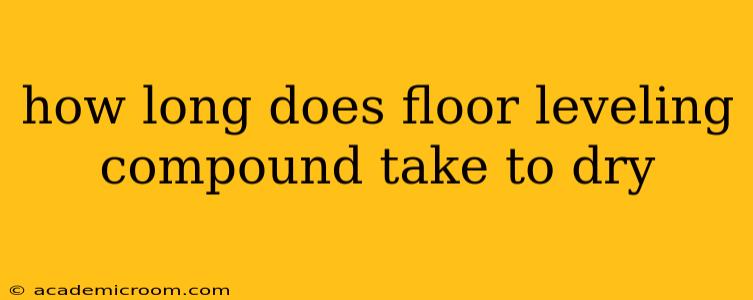Leveling your floors can dramatically improve the look and feel of your home, creating a smooth, even surface perfect for new flooring. However, the success of your project hinges on understanding the drying time of your chosen floor leveling compound. This isn't a one-size-fits-all answer; drying time depends on several crucial factors. Let's explore these factors and provide a comprehensive guide to help you accurately estimate drying time.
What Factors Affect Floor Leveling Compound Drying Time?
Several factors significantly influence how long your floor leveling compound takes to dry completely. Understanding these will help you manage expectations and avoid costly mistakes.
-
Type of Compound: Different leveling compounds have different drying times. Cement-based compounds generally take longer than self-leveling compounds. Always check the manufacturer's instructions on the packaging for specific drying time estimates.
-
Thickness of the Application: Thicker applications will naturally take longer to dry than thinner ones. A thin layer might dry in a few hours, while a thicker layer could require a day or more.
-
Ambient Temperature and Humidity: Warm, dry air accelerates drying, while cool, humid conditions significantly slow it down. Ideally, you want a temperature between 60-75°F (15-24°C) and low humidity.
-
Ventilation: Proper ventilation is crucial. Good airflow helps remove moisture from the compound, speeding up the drying process. Poor ventilation can trap moisture, leading to longer drying times and potentially compromising the integrity of the leveling compound.
-
Product Additives: Some manufacturers offer additives designed to accelerate or slow down the drying process. If you use an additive, carefully follow the manufacturer's instructions regarding drying times.
-
Subfloor Material: The type of subfloor can also affect drying time. Porous subfloors might absorb more moisture, potentially lengthening the drying period.
How Long Does It Typically Take to Dry?
While exact drying times vary wildly, here's a general guideline:
-
Self-Leveling Compounds: These typically dry to a walkable surface within a few hours (often 4-8 hours), but full curing (ready for flooring installation) might take 12-24 hours, or even longer depending on the thickness and conditions.
-
Cement-Based Compounds: These usually require much longer drying times, often 24-72 hours or more to become walkable, and several days to fully cure before installing new flooring.
What Happens If the Compound Doesn't Dry Properly?
Insufficient drying can lead to several problems:
- Cracking: The compound may crack as it dries unevenly.
- Delamination: The compound may peel or separate from the subfloor.
- Uneven Surface: The final floor might be uneven, bumpy, or otherwise imperfect.
- New Flooring Issues: Installing new flooring prematurely could cause adhesion problems, leading to costly repairs or replacement.
How to Check if the Floor Leveling Compound is Dry?
Don't rely solely on the estimated drying time. Always perform a thorough check before installing new flooring. Here are some methods:
- Touch Test: Gently touch the surface. If it feels dry to the touch, it might be ready. However, this is not a foolproof method.
- Moisture Meter: A moisture meter is a more reliable method to determine the moisture content of the compound. Follow the manufacturer's instructions for the appropriate moisture level before proceeding.
- Visual Inspection: Look for any signs of dampness, such as discoloration or lingering moisture.
How Can I Speed Up the Drying Process?
While you can't drastically alter the inherent drying time of the compound, you can optimize the environment to accelerate the process. Improved ventilation and a slightly warmer temperature (within safe limits) can help.
Remember, patience is key when working with floor leveling compounds. Rushing the process can lead to costly mistakes and a poorly finished floor. Always refer to your specific product's instructions for the most accurate drying time estimates and follow the manufacturer's recommendations for proper application and curing.
